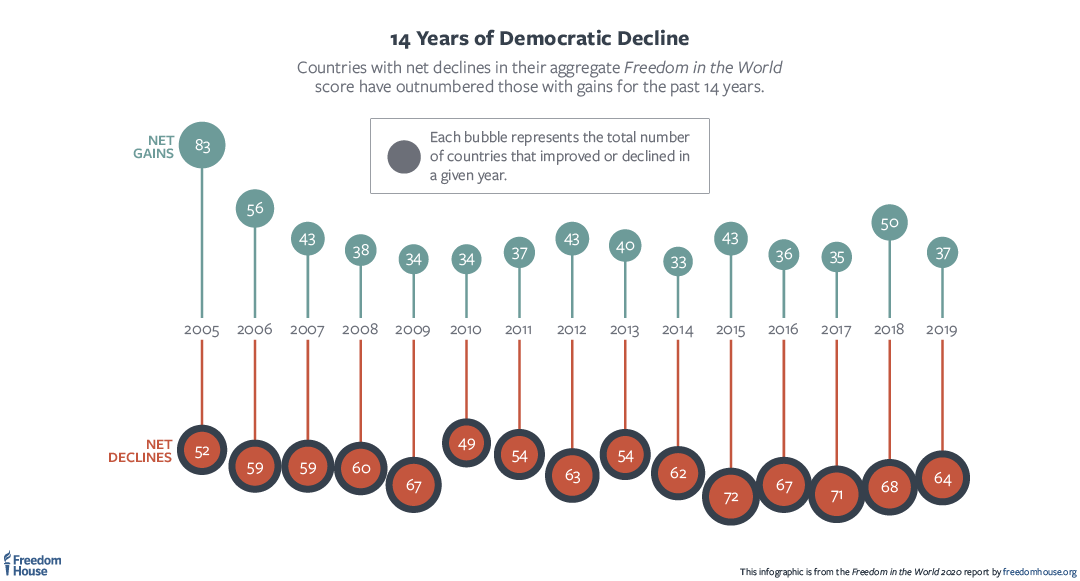
In the wake of Freedom in the World 2020, the latest survey of political rights and civil liberties in 210 states, which details continuing democratic deterioration, Freedom House offers a number of recommendations for democracies and other actors for responding to the regression.
Democracies should work to support their core principles at home and around the world. The following recommendations are intended to provide a framework for democratic countries as they pursue this goal, the rights watchdog contends:
Strengthen and protect core values
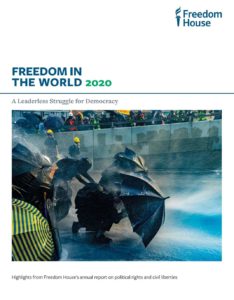 Respect, protect, and fulfill human rights at home. Attacks by elected leaders on democratic institutions—including the press, an independent judiciary, and anti-corruption agencies—and on the rights of minorities and migrants undermine faith in democracy around the world. Democratic leaders should demonstrate respect for fundamental norms at home by adhering to domestic legislation in line with international human rights laws and standards, and refraining from rhetoric that undermines these standards.
Respect, protect, and fulfill human rights at home. Attacks by elected leaders on democratic institutions—including the press, an independent judiciary, and anti-corruption agencies—and on the rights of minorities and migrants undermine faith in democracy around the world. Democratic leaders should demonstrate respect for fundamental norms at home by adhering to domestic legislation in line with international human rights laws and standards, and refraining from rhetoric that undermines these standards.
Strengthen public support for democratic principles by investing in civic education. To protect freedom domestically and build support for a foreign policy that protects democratic rights and values abroad, it is essential to foster a stronger public understanding of democratic principles, especially among young people……
Guard against manipulation by authoritarian actors
Increase transparency requirements for foreign state-owned propaganda outlets operating in democratic states. Outlets like Russia’s RT and China’s CGTN spread government-approved narratives without clearly disclosing that they are government financed. Measures to improve transparency could include reporting requirements for media outlets’ spending on paid advertorials (advertisements designed to resemble an independent, objective news article), ownership structures, and other economic ties to repressive state actors.
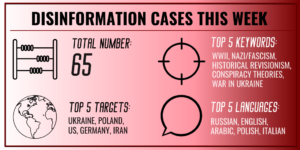 Require social media companies to report foreign efforts to spread online disinformation and propaganda. Social media companies should be required to report regularly to target governments on efforts by foreign governments and nonstate actors to manipulate public opinion and undercut democratic values by spreading disinformation and propaganda on their platforms…..
Require social media companies to report foreign efforts to spread online disinformation and propaganda. Social media companies should be required to report regularly to target governments on efforts by foreign governments and nonstate actors to manipulate public opinion and undercut democratic values by spreading disinformation and propaganda on their platforms…..
Address the use of bots on social media. Bots (automated accounts pretending to be real people) can be used to distort the online media environment by rapidly spreading false information, fomenting discord, and drowning out independent reporting and factual information. Democracies should address the use of bots in social media manipulation. ….
Preventing election interference. Efforts should include protecting elections from cyberattacks through the use of paper ballots and election audits, and improving transparency and oversight of online political advertisements……
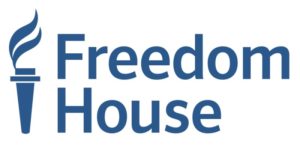 Strengthening laws that guard against foreign influence over government officials. Legislative proposals requiring greater transparency about officials’ personal finances and campaign donations, more rigorous standards for the disclosure of conflicts of interest, and the establishment of a clear code of conduct for engagement with foreign officials can help insulate governments from foreign attempts to subvert democratic institutions. ….
Strengthening laws that guard against foreign influence over government officials. Legislative proposals requiring greater transparency about officials’ personal finances and campaign donations, more rigorous standards for the disclosure of conflicts of interest, and the establishment of a clear code of conduct for engagement with foreign officials can help insulate governments from foreign attempts to subvert democratic institutions. ….
Preventing corrupt foreign officials from laundering stolen assets through democracies. Corrupt actors steal more than $3 trillion annually from their home countries, the effects of which undermine institutions critical to democracy and harm economic growth in these countries. Stolen funds are routinely funneled through international financial markets, laundered via seemingly legitimate purchases in democratic nations. These practices pose a risk to the reputations of companies unwittingly involved and to financial markets overall. Democracies should strengthen transparency laws to ensure that accurate identifying information about purchasers and their funding sources is available. …..
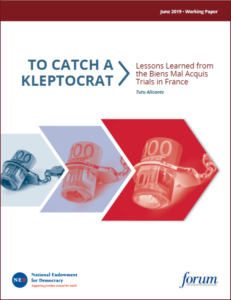 Making the fight against kleptocracy and international corruption a key priority. In the United States, the proposed CROOK Act (H.R. 3843) would establish an action fund that would offer financial assistance to foreign countries during historic windows of opportunity for anticorruption reforms. …..
Making the fight against kleptocracy and international corruption a key priority. In the United States, the proposed CROOK Act (H.R. 3843) would establish an action fund that would offer financial assistance to foreign countries during historic windows of opportunity for anticorruption reforms. …..
Restrict the export of sophisticated surveillance tools to unfree countries, and require businesses exporting dual-use technologies to report on the human rights impact of those products. Technologies such as facial-recognition surveillance, social media monitoring, and targeted interception or collection of data equip authoritarian governments with new and robust power to violate fundamental rights. The sale of such technologies—including those that use machine learning, natural-language processing, and deep learning—should be restricted for countries rated Partly Free or Not Free by any Freedom House publication. ….
Defend and expand democracy around the world
Emphasizing democracy-strengthening programs in foreign assistance. Democracies are to be applauded for the significant resources they have invested in recent decades to strengthen democratic movements, systems, and institutions around the world. Yet significant, consistent funding and creative approaches that take advantage of new technological tools and data are needed to counter authoritarian resurgence. Democracies should select priorities based on recognition of what can realistically be achieved through external assistance, with emphasis on long-term and locally driven solutions. …
Focusing attention and funding on countries at critical junctures. These include countries that have experienced recent expansions in freedom, such as Ethiopia and Sudan, as well as countries in which democratic progress is threatened, such as Benin and Sri Lanka….
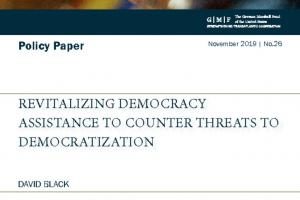 Supporting civil society and grassroots movements calling for democracy. Peaceful protest movements calling for reform can spur long-term democratic change, but face greater odds without international support. Democratic governments should provide vocal, public support for grassroots pro-democracy movements, and respond to any violent crackdowns by authorities with targeted sanctions, reduced or conditioned foreign assistance, and public condemnation.
Supporting civil society and grassroots movements calling for democracy. Peaceful protest movements calling for reform can spur long-term democratic change, but face greater odds without international support. Democratic governments should provide vocal, public support for grassroots pro-democracy movements, and respond to any violent crackdowns by authorities with targeted sanctions, reduced or conditioned foreign assistance, and public condemnation.
Investing in alliances with other democracies, and in multilateral institutions. Confronting authoritarian and antidemocratic trends globally requires a united front among democratic nations. Assumptions that a country’s individual sovereignty is threatened by deep cooperation with allies will only isolate democracies from one another, leaving them weaker and less capable of meeting the challenge of resurgent authoritarianism. …..
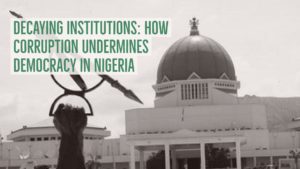 Addressing impunity by imposing targeted sanctions on individuals and entities involved in human rights abuses and acts of corruption. In the United States, a variety of laws allow authorities to block visas or freeze the assets of any person or entity, including private companies, that engages in or supports corruption or human rights abuses…..
Addressing impunity by imposing targeted sanctions on individuals and entities involved in human rights abuses and acts of corruption. In the United States, a variety of laws allow authorities to block visas or freeze the assets of any person or entity, including private companies, that engages in or supports corruption or human rights abuses…..
Recommendations for the Private Sector….RTWT
Policy Recommendations for strengthening democracy from @NEDemocracy partner @freedomhouse https://freedomhouse.org/policy-recommendations-strengthening-democracy#.XmBSFyuQ5TA.twitter







